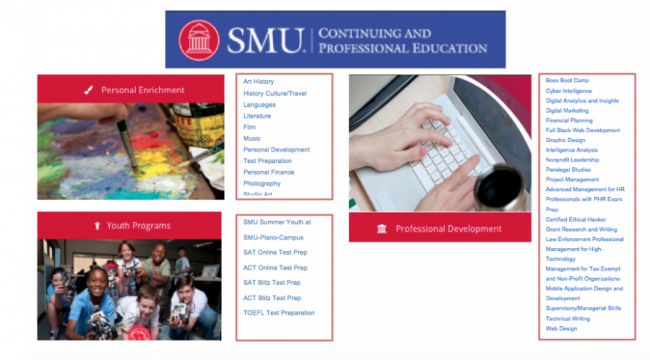Imagine being set in a career as a teacher but dreaming of a more artistic life. Would you have the time and guts to pursue your dream? How would you do so? How much would it cost?
These are the questions one SMU professor considered when she decided to take her art career to a different level after receiving her MFA from SMU’s Meadows School of the Arts.
Suzanne Clark was an artist and a community college professor at Eastwood Community College when she decided to take her first continuing education class — a course in marketing personal artwork — at SMU.
Clark is now a continuing education professor at SMU who makes a living in an easel-lined classroom, helping others enhance their artistic abilities.
“I very much enjoy working with adult learners who have always wanted to paint and never had time to allow themselves to do it,” Clark said. “Often, they tell me that the class has changed the way they see the world.”
Continuing and Professional Education (CAPE) is a program offered at SMU that allows individuals — including some undergraduates — to sign up for various courses that offer opportunities including test preparation courses, professional development and certificate courses like financial planning or graphic design, workshops for learning enhancement like Advanced Excel, personal enrichment courses like ‘Secrets of Machu Pichu,’ and summer youth programs.

CAPE also offers an online master’s degree in Data Science, available to anyone in the Dallas area. The opportunities in CAPE are close to endless, and class registration fees start as low as $39. They can range as high as $3,000, but the program is an extremely underutilized program, especially by SMU students, officials say.
Most of the courses are taught on SMU’s main campus by both SMU professors and experts outside of campus. However, courses are also held on SMU’s East Campus, Plano Campus and at SMU Taos.
CAPE programs generate nearly $10 million per year for SMU, according to CAPE Managing Director Kimberly Rutigliano. She said in a telephone interview that CAPE programs are imperative to the university because the revenue generated by these courses goes straight to the office of the provost.
Rutigliano said CAPE programs are run like a business within SMU, and they cover their own costs. Once revenue goes to the provost’s office, it is up to the provost’s discretion to disperse the money where it is needed. This has the potential to do things like keep tuition costs down.
“CAPE is like a profit center for the university,” Rutigliano said. “It is a drop in the bucket compared to SMU tuition, but whatever we generate goes towards university initiatives.”
CAPE also offers many unique programs that SMU students may find interesting and rewarding or that could aid in their future careers, CAPE Associate Provost Larenda Mielke said.
Preparation courses for the GRE, GMAT and LSAT are available to the public for tuition fees around $1,000. According to Miekle, these courses are also extremely underutilized by SMU students, most likely because students do not know about them.
Miekle said the lack of knowledge about CAPE prevents students from exploring their options.
“One of the things people don’t realize is that we offer very cutting-edge courses,” Miekle said. “We offer a lot of courses that aren’t even offered on a regular class schedule.”
Senior pre-law student Layth Kahl said he has been studying for the LSAT on a nightly basis and didn’t realize SMU offered prep classes. He said he had never heard of CAPE but would like to look deeper into the program because taking an LSAT class at SMU would be convenient.
Katherine Hardin, a graduate speech pathology student at the University of Texas at Dallas, took an SMU CAPE test preparation course for the GRE in 2015. She said she had to take the GRE twice, but after taking the CAPE course her scores improved by 15 points.
“Taking this class did wonders for my scores and application to grad-school,” Hardin said. “It’s hard to believe more students don’t make use of them.”
The CAPE program continues to expand across SMU’s campus. For more
information on its courses or prices, visit https://www.smu.edu/cape.








